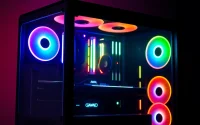Leading PC CASE Manufacturer: Elevate Your Gaming Experience with Stylish and Functional Designs
Understanding PC CASE Manufacturers
The PC case, or computer chassis, is paramount in the successful assembly and functionality of any personal computer. As a critical component, it supports all internal hardware, provides necessary cooling, and protects your valuable components. In the realm of PC components, the importance of selecting a reputable PC CASE Manufacturer cannot be overstated, especially with the proliferation of brands offering varying levels of quality, design, and performance. This section delves into the essential characteristics that define a great PC case manufacturer, as well as an overview of the market landscape.
What Makes a Great PC CASE Manufacturer?
When evaluating the prowess of a PC case manufacturer, several factors stand out. These attributes shape the overall performance and reliability of the cases they produce:
- Quality Control: A trustworthy manufacturer implements rigorous quality control measures throughout the production process to ensure each case meets specific standards and requirements.
- Diverse Offerings: A great manufacturer provides a variety of case designs, sizes, and formats to accommodate different builds and user preferences.
- Innovation: The technology landscape is ever-evolving, and leading manufacturers invest in research and development to bring innovative features to their products, such as advanced cooling systems, cable management solutions, and enhanced modular designs.
- Brand Reputation: Positive feedback from the community and recognition from industry experts significantly contribute to a manufacturer’s standing in the market.
- Customer Support: Reliable after-sales support and a clear warranty policy can greatly enhance customer satisfaction and loyalty.
Key Features of Quality PC Cases
Quality PC cases share common features that enhance not only aesthetics but also usability and functionality. Here are some key aspects to monitor:
- Airflow and Cooling: Good cases are designed to enhance airflow and support multiple cooling options, including air and liquid cooling. Features such as fan mounts and mesh panels allow for optimal thermal management.
- Material Durability: Whether it’s steel, aluminum, or tempered glass, the materials used in a PC case can affect its longevity and robustness. Light, sturdy materials not only ensure a sleek look but also provide adequate protection for internal components.
- Ease of Assembly: Users prefer cases that simplify the building process, featuring tool-less designs, ample space for cable management, and accessible drive bays.
- Compatibility: A quality PC case needs to fit various components such as motherboards of different sizes, graphics cards, and drives. Explicit compatibility information assists buyers in making informed decisions.
- Aesthetic Appeal: A visually appealing design with customizable RGB elements or minimalist styling appeals to today’s gamers and PC builders alike.
Top Manufacturers and Their Offerings
With so many manufacturers in the PC case market, a few stand out as reliable choices for quality and innovation:
- Corsair: Known for their stylish designs and superb airflow, Corsair produces both budget-friendly and high-end gaming cases.
- Fractal Design: Renowned for their minimalistic aesthetic and excellent build quality, Fractal cases often come with exceptional noise dampening features.
- Lian Li: Specializing in aluminum cases, Lian Li balances aesthetics with functionality, often focusing on cooling performance and build quality.
- NZXT: A favorite among gamers, NZXT emphasizes customizable RGB lighting and intuitive designs with the H and S series cases.
- Thermaltake: Known for their innovative solutions such as the Tower 500, Thermaltake offers cases with customizable layouts suited for advanced users.
Types of PC Cases in the Market
The type of PC case you choose can dramatically impact the overall performance and aesthetics of your rig. Here’s a closer look at the different types of cases available in the market today:
Full Tower, Mid Tower, and Mini Tower: What’s the Difference?
The classification of PC cases generally revolves around size and design. Understanding these categories is crucial to making the right choice:
- Full Tower Cases: These offer extensive space for components, multiple drive bays, and advanced cooling options. Ideal for high-performance builds or users planning to expand their hardware over time.
- Mid Tower Cases: A popular choice for most PC builders, mid-tower cases combine a moderate price tag with ample space for conventional setups. They support standard ATX motherboards and are versatile across various builds.
- Mini Tower Cases: Compact and suitable for budget systems or space-constrained environments, mini tower cases are designed primarily for micro-ATX and Mini-ITX motherboards and often lack the expandability of larger cases.
Choosing Between ATX, Micro-ATX, and Mini-ITX Cases
Another important consideration is the motherboard size compatibility with your selected case:
- ATX Cases: Designed for standard ATX motherboards, these cases usually offer several expansions and good airflow options, making them ideal for mid to high-end builds.
- Micro-ATX Cases: These support micro-ATX motherboards and allow for a more compact build while still providing ample ports and slots.
- Mini-ITX Cases: Created for smaller setups that emphasize portability, these cases can be challenging to work in due to their limited space but often feature unique designs that appeal to minimalists.
Custom vs. Pre-built PC Cases
The choice between custom and pre-built PC cases also impacts usability and personalization:
- Custom Cases: Tailored to specific needs, custom cases allow enthusiasts to create uniquely functional builds, often integrating advanced cooling solutions or aesthetic flourishes aimed at personal flair.
- Pre-built Cases: Ready-to-use boxes complete with standard layout configurations offer convenience, particularly for beginners or those seeking plug-and-play solutions. They save time but may offer fewer customization options.
Design Elements of PC Cases
Design plays a pivotal role in the performance and visual appeal of PC cases. This section explores the vital design elements employed by PC CASE manufacturers.
Importance of Aesthetic in PC CASE Manufacturing
For many builders and gamers, aesthetics are just as crucial as functionality. Here’s why the design aspect matters:
- Brand Identity: Aesthetic designs bolster brand identity and create memorable experiences for users. Manufacturers often incorporate distinctive designs that attract customers.
- Personalization: Custom features such as RGB lighting, tempered glass panels, and modular layouts cater to a user’s personal style and preferences, enhancing engagement with the product.
- Market Differentiation: In a competitive landscape, unique design elements help manufacturers stand out, enabling them to appeal to niche markets.
Cooling Solutions: Fans, Radiators, and Airflow Design
The efficiency of cooling solutions within a PC case can significantly impact performance. Here are some cooling aspects to consider:
- Airflow Design: Effective airflow management is designed into proximate fans for intake and exhaust. Strategic placement of fans and mesh panels allows for the most critical airflow dynamics.
- Compatibility with Radiators: For those utilizing liquid cooling systems, the case should support various radiator sizes, ensuring optimal thermal performance is maintained.
- Advanced Cooling Options: Features such as fan controllers, dust filters, and modularity enhance airflow efficiency and overall cooling effectiveness.
Materials Used in PC CASE Production
The materials selected by manufacturers can influence both performance and design. Here are some common materials:
- Steel: Durable and cost-effective, steel offers strength for protection and stability in larger builds. It tends to have a higher weight but is widely used in budget cases.
- Aluminum: Lightweight but sturdy, aluminum cases are favored for their premium feel and superior heat dissipation, often appealing to high-end users.
- Tempered Glass: Used for aesthetic panels, tempered glass provides a visual showcase for premium components, often integrated with RGB lighting for enhanced visual impact.
Buying Guide for PC Cases
Choosing the right PC case requires considerate planning. This buying guide outlines crucial factors to help you make an informed decision.
Identifying Your Needs: Gaming vs. Professional Use
Different users have different needs when it comes to their PCs. It’s crucial to align your case choice with your primary usage:
- Gaming Cases: Look for strong cooling capabilities, support for multiple GPUs, and aesthetically appealing designs that can include RGB lighting.
- Professional Cases: Prioritize functionality and sufficient space for components. Options with quieter operation and efficient cable management may serve professionals best, be it for design work or software development.
Budgeting for Your PC Case: What to Expect
PC case prices reflect their features, designs, and build quality:
- Entry-Level Cases: Budget models generally start from $50 and can still offer considerable quality for basic builds.
- Mid-Range Cases: Expect to spend between $75 and $150 on mid-tier models, which balance quality and features.
- High-End Cases: Premium options priced above $150 cater to enthusiasts and professionals seeking unique designs and superior performance.
Where to Buy: Online vs. Retail Stores
Choosing where to purchase your PC case can also influence your experience:
- Online Retailers: Websites often provide more extensive selections, competitive prices, and user reviews that help evaluate products based on community feedback.
- Local Computer Stores: Buying in-store allows you to physically examine the case and consult with staff for advice, reducing the risk of fraud or receiving damaged goods.
Future Trends in PC CASE Manufacturing
As the technological landscape evolves, so do the trends in PC case design and manufacturing:
Emerging Technologies in PC Case Design
Innovations continue to shape future cases:
- Smart Features: The introduction of smart cases with integrated features such as temperature and humidity sensors is on the horizon, contributing to enhanced user experience.
- Modular Designs: Modular cases that allow users to swap out parts easily while building or upgrading are gaining traction, making maintenance simpler.
- Virtual Reality Compatibility: With the rise in VR gaming, cases that accommodate better VR setups and cabling streaming solutions are becoming more prevalent.
Sustainability in the PC CASE Manufacturing Process
Environmental considerations are becoming increasingly critical for manufacturers:
- Recyclable Materials: Manufacturers are researching the use of recyclable materials in their production without compromising quality.
- Energy-Efficient Production: The implementation of energy-efficient manufacturing practices helps to reduce waste and environmental impact.
Community Feedback on Leading Manufacturers
Manufacturer reputation is crucial. Community forums and user feedback provide invaluable insights into user experience:
- Online Reviews: Checking reviews on e-commerce sites and specialized forums can give you a real-world perspective on product performance and support.
- Community Input: Joining online communities allows for sharing experiences, which can guide you towards the best brands and models based on collective expertise.


